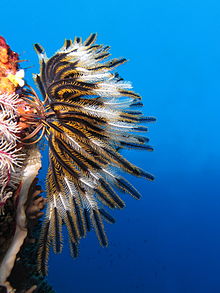Crinozoa
| Crinozoa Temporal range:
| |
|---|---|

| |
| Crinoid on the reef of Batu Moncho Island, Indonesia | |
| Scientific classification | |
| Domain: | Eukaryota |
| Kingdom: | Animalia |
| Phylum: | Echinodermata |
| Subphylum: | Crinozoa Matsumoto 1929 |
| Classes | |
| |
Crinozoa is a subphylum of mostly sessile echinoderms, of which the crinoids, or sea lilies and feather stars, are the only extant members.[1][2] Crinozoans have an extremely extensive fossil history.[citation needed]
Classes within Crinozoa
[edit]As published in the Treatise on Invertebrate Paleontology, Crinozoa included all stemmed groups except for the few stemmed basal solutes.[3] When Blastozoa was erected to contain stalked forms with brachioles rather than arms, only Crinoidea and Paracrinoidea remained within Crinozoa.[4][5] Recent cladistic work has placed Paracrinoidea under Blastozoa,[6] although some sources continue to include Paracrinoidea.[2]
One proposal for the cladistic placement of the Homalozoan classes groups Stylophora together with crinoids to form Crinozoa.[7] A 2024 survey of recent research finds more support for Homalozoa as a paraphyletic assemblage along the echinoderm stem group, but noted that the position of Stylophora in particular was uncertain.[8]
If neither Paracrinoidea nor Stylophora can be included, Crinozoa would be equivalent to the Crinoidea total group.
See also
[edit]- List of echinoderm orders
- Blastoids, superficially similar-appearing echinoderms that belong to a different echinoderm subphylum.
References
[edit]- ^ Newton & Dennis 2021
- ^ a b "WoRMS - World Register of Marine Species - Crinozoa". www.marinespecies.org. Retrieved 2023-09-16.
- ^ Ubaghs 1967, pp. S51–S52
- ^ Sprinkle 1973, p. 4
- ^ Sprinkle 1980, p. 26
- ^ Limbeck et al. 2024
- ^ David et al. 2000, pp. 547–551
- ^ Rahman & Zamora 2024, pp. 308–310
Works cited
[edit]- David, Bruno; Lefebvre, Bertrand; Mooi, Rich; Parsley, Ronald (December 2000). "Are homalozoans echinoderms? An answer from the extraxial-axial theory". Paleobiology. 26 (4): 520–555. doi:10.1666/0094-8373(2000)026<0529:AHEAAF>2.0.CO;2.
- Limbeck, Maggie R.; Bauer, Jennifer E.; Deline, Bradley; Sumrall, Colin D. (2024). "Initial quantitative assessment of the enigmatic clade Paracrinoidea (Echinodermata)". Paleontology. 67 (3). doi:10.1111/pala.12695.
- Newton, Alisa L.; Dennis, Michelle M. (2021-03-23), LaDouceur, Elise E.B. (ed.), "Echinodermata", Invertebrate Histology (1 ed.), Wiley, pp. 1–18, doi:10.1002/9781119507697.ch1, ISBN 978-1-119-50765-9, S2CID 261009894, retrieved 2023-08-04
- Rahman, Imran A.; Zamora, Samuel (July 2024). "Origin and early evolution of echinoderms". Annual Review of Earth and Planetary Sciences. 52: 295–320. doi:10.1146/annurev-earth-031621-113343. hdl:10141/623070.
- Sprinkle, James (1973). "Morphology and evolution of blastozoan echinoderms". Special Publication of the Museum of Comparative Zoology, Harvard University. Retrieved 29 October 2024.
- Sprinkle, J. (1980). "An Overview of the Fossil Record". Notes for a Short Course: Studies in Geology. 3: 15–26. doi:10.1017/S0271164800000063.
- Ubaghs, Georges (1967). "General Characters of Echinodermata". In Moore, Raymond C. (ed.). Treatise on Invertebrate Paleontology, Part S: Echinodermata 1. Vol. 1. University of Kansas Press. pp. S3–S60. Retrieved 29 October 2024.
